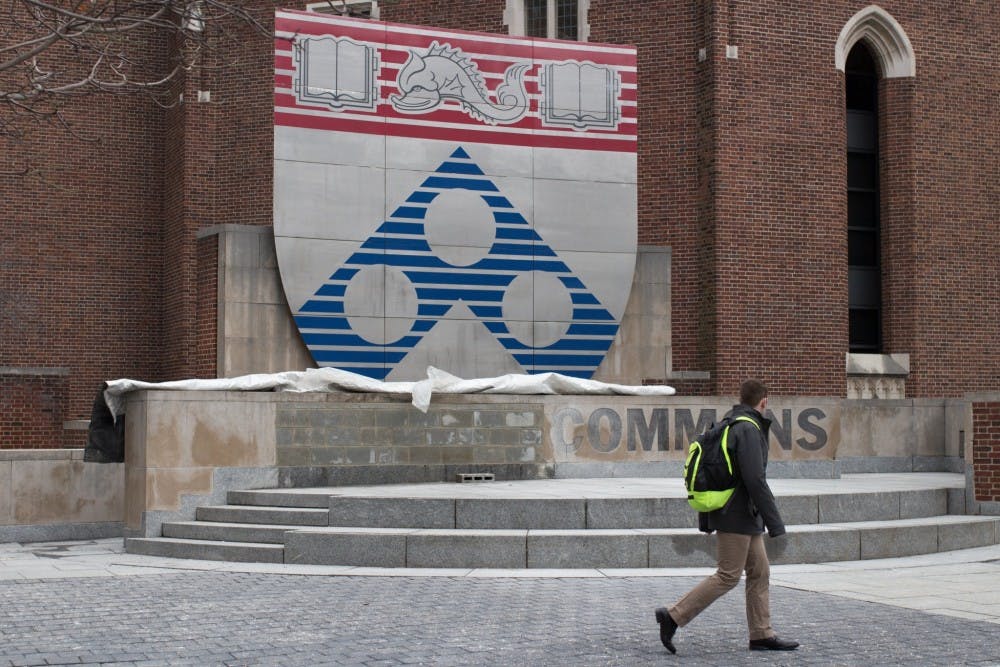In a historic move, Penn President Amy Gutmann and Chair of Penn's Board of Trustees David L. Cohen announced Thursday they would revoke the honorary degrees of Steve Wynn and Bill Cosby and remove Wynn's name both from the outdoor signage in "Wynn Commons" and from the scholarship fund his donation created.
Early on Feb. 2, Wynn's name was completely scraped from the seal outside Houston Hall. After temporarily covering the word "Wynn" with a metal board on Feb.1, the University removed his name entirely and replace it with bricks.
This decision, the first time Penn has rescinded an honorary degree in over a century, came after multiple allegations of sexual misconduct surfaced against Wynn.

While many student leaders applauded the administration for cutting ties with Wynn and Cosby, some students want Penn to focus more on campus policy and ensure reporting sexual assault becomes less burdensome.
"The most important thing is if that same philosophy carries over into how administration deals with sexual violence issues on Penn’s own campus especially where it comes to policy and the violence issues that students come into contact with," said College senior Ariana Martino, who is the producer for V-Day and the Vagina Monologues show.
"That should be getting equally as much attention if not more in terms of what students are looking for," she added.
Fifth-year Graduate School of Education student Mark Lewis, a member of the pro-union group Graduate Employees Together — University of Pennsylvania, said Penn's move was a "symbolic gesture" and that the "real significant ways to address sexual violence and sexual harassment need to include looking at our own policies.”
“The first thing I thought of was that it was a symbolic gesture and a much needed additional response would be to implement a serious grievance procedure so that students who experience sexual harassment have a process to go through," he said.
Lewis helped author a petition last semester calling for a better system to report incidents of sexual misconduct within GSE, after several incidents involving faculty members in the graduate schools highlighted discrepancies in the reporting procedure.
Another area of concern for some students was the time it took Penn to finally cut ties with Cosby. By November 2015, more than 10 schools had revoked Cosby's honorary degree in response to dozens of highly-publicized allegations of sexual assault. At the time, Penn spokesperson Stephen MacCarthy told The Daily Pennsylvanian that "it is not our practice to rescind honorary degrees."
More than a couple students and alumni pointed out the reversal on social media.
Even The New York Times, which produced its own writeup on the University's decision, noted the delay in punishing Cosby.
"When we decided to revoke Wynn's honorary degree, the decision in turn made it clear that the multiple and highly credible charges involving Bill Cosby warranted the same action. This is simply the right thing to do at the right time, Director of Media Relations Ron Ozio wrote in an email to the DP on Thursday.
Graduate and Professional Student Assembly President Miles Owen, a third-year Design and School of Arts and Sciences professional master's student, praised Penn's decision but urged the University to keep students a part of any future deliberative actions, given that the Board of Trustees decided to cut ties with Wynn and Cosby after "a group of trustees, alumni, deans, and faculty" recommended the change.
"We would love see student representatives on the committee that makes these decisions so that the entire Penn community can be engaged in this important process," Owen said.
Others on campus, who acknowledged a need to refine policies governing sexual harassment policy, said students needed to take action as well.
"Penn can provide those resources, but it’s really on the members of the community," said College senior Nicholas Carrina, the president of Men Against Rape and Sexual Assault, an anti-violence education group. "I really would love to see the undergraduate community, especially with the communities that make up the undergraduate community, really take action.”
Vice President of the Undergraduate Assembly and College junior Jay Shah said he was surprised that Penn took such bold action, but thought the University made the right call.
"It sends a very powerful message that there will be no tolerance for actions like those and Penn is really not the place for that kind of injustice," said, who is also a Daily Pennsylvanian opinion columnist.
"Sexual assault allegations should not be taken lightly and I highly commend the administration for taking these actions."
Staff reporters Giovanna Paz, Manlu Liu, Naomi Elegant, Urooba Abid, and Claire Sliney contributed to this article.



